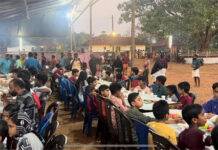
In times when we see growing communalisation of consciousness and enhanced trends that lead us to a fragmented, divided and throughly disillusioned social order, many parents are worried. What kind of a future awaits their children? Unity in diversity seems to be a fairy tale. WhatsApp University is manufacturing graduates trained in hatred, bigotry and communalism. Schools and colleges are more or less failing to teach moral values which celebrate democracy, diversity, and inclusivity. How do we teach our children the importance of equality and togetherness when the society we live in is so hierarchical and divided?
Here are a few ways in which we can help provide a more inclusive, secular and democratic childhood to our children even while we experience growing ghettoisation and intolerance as far as the lager polity is concerned.
Lets Read the Constitution Together
The Constitution guarantees freedom and basic rights to all citizens without discriminating against anybody. It would be nice to have a copy at home. On holidays when everybody is at home, the family can engage in some common reading sessions. Close relatives and family friends can also be involved. This would make the adults more aware of its provisions. Children will also learn about their rights and duties from a young age. Children who learn to respect the Constitution from their home would think twice before violating it upon growing up. It is a good practice for nurturing responsible future citizens.
Friendship Must Go Beyond Boundaries
It is not uncommon to see ghettoization even inside the classroom. Children tend to become friends with those like them as compared to with those who are different. Sometimes teachers themselves tend to isolate students from marginalized backgrounds. What is a better place than a classroom to know more people? Encourage your kids to talk to everybody in the class, including the quiet ones. It does not matter whether your child’s friends are rich or poor, forward caste or backward caste, Parsi or Sikh. What matters is that your child learns to see them as human beings irrespective of their socio-economic background.
Many Religions, Many Occasions to Celebrate
Why not celebrate Eid, Christmas, as well as Diwali? Why not find out why Makar Sankranti, Lohri, Pongal and Bah are all celebrated around the same time? Why not visit Muslim friends while they celebrate Eid and why not visit a church with Christian friends on Christmas eve? Why not invite friends of other faiths while we celebrate something at home?
Festivals are an occasion for meeting and greeting. Celebrating different festivals would help children know more about different religious and cultural practices. It is essential to celebrate diversity in order to eschew stereotypes and myths about the other. The more closely we know the other, the better we might understand them and the lesser the likelihood of bigotry.
Debates Encourage Criticality, Lets Encourage Them
The smartphone generation has lost the art of conversation. Children no longer like to go out and play; they would prefer watching TV or playing video games. How do we teach our children to talk? The art of conversation is learnt at home before the child goes to school. Teach your children to talk and to ask questions as and when necessary. More importantly, teach them to listen. The more they listen, the more will they be able to know about different people. Every child has a story. Listening to different stories from their peers might make them more sensitive and caring right from childhood. Teach them to respect elders, be it the woman selling vegetables in the market or your house help.
At the same time, hone their debating skills. Teach them to respect the opinion of others, but to disagree whenever necessary. It is important for them to learn that everybody has the right to express themselves. However, this does not mean that they do not allow others to articulate their viewpoints. Help them learn the art and skill of debating. Make them a good listener and communicator.
Let Your Words and Your Actions Sync
Your kids learn the most when you are not teaching, by observing your behaviour and actions. Everything that you speak and do while they are around matters. Ensure that you never speak ill of any community or people in front of them, as they are very likely to pick up that prejudiced attitude from you. Treat everyone around you with respect and your kids will follow you. Provide them an excellent example of a law-abiding citizen who respects and follows rules. Your actions will always speak louder than your words.
Parenting is a skill that cannot be learnt through books. However, by striving to be a good citizen yourself and creating a happy and healthy environment at home, you can do your bit towards creating a better world. Your children are the citizens of tomorrow; the future of the nation lies in your hands. Do everything you can for moulding responsible future citizens. After all, good citizens make good governments and a progressive country. Change begins from you, and now.












